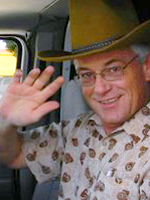A day in the life at Acton Rehab
Leon Worden · November 27, 1996
Alcohol was the drug of choice when I was at Hart High School almost 20 years ago. Pot was available, and other things too, if you knew where to look. But most of us would go out every Friday night and drink beer.
Some of us could handle drinking, some of us couldn't. I certainly wouldn't be the productive member of society I like to think I am today if I hadn't quit drinking altogether in 1985.
I'm told that marijuana is the drug of choice on our high school campuses today. Children are introduced to a wider variety of drugs, and at earlier ages, than when I was in school. But even from my own experiences at Hart High in the late '70s, I can tell you that any parent who thinks his children aren't at risk every morning when he sends them off to school is an idiot. Even in Valencia.
My fellow Signal columnist Richard Rioux invited me to spend the afternoon Friday at the alcohol and drug rehab center he runs in Acton. It's one of about 200 treatment programs funded by the County of Los Angeles but one of just two that the county directly operates -- the other being at Warm Springs, which Rioux also runs.
The Acton facility was built in 1933 to house Civilian Conservation Corps (CCC) workers -- indigent young men who did manual labor in exchange for room and board. The county took over in the 1940s and filled the cabins and bungalows with older indigent men, mostly alcoholics. Today, about one-third of the men and women at Acton are court referrals. The rest are there because they want to be.
They come in all sizes, shapes and colors. Some are high school dropouts, some are college graduates. Some started abusing drugs in elementary school, some started later in life. "Drugs and alcohol don't discriminate," says Michael, a recovering addict who holds a bachelor's degree.
Many, if not most, are polydrug abusers. Leonard is typical. Now 35, Leonard ran away from a broken home at age 12 and started sniffing glue and drinking. He moved on to PCP. In high school he drank more and started smoking cocaine.
"My mind is functioning now after being here only a month," says Leonard. He participates in the center's literacy program, which relies heavily on literate Acton patients to teach everything from basic reading and writing skills to preparatory courses for high school equivalency exams.
"Leonard is always the first one in class and the last to leave," says Michael, his tutor, who draws from his own experiences to reach his pupil. "If I ask him 20 times 10, he can't answer," Michael says. "But if I ask him to multiply $20 bills by 10, it's no problem."
The literacy program began in 1989 and has increased Acton's success rate markedly. One quarter of the roughly 300 addicts participate, and they have about a 30 percent higher completion rate than the rest of the population, Rioux says.
How successful is Acton? It depends on how you measure it, but a recent study shows that 47 percent of the people who walk in the front door stay long enough for "the miracle to happen," as they put it. That in itself is saying something, when you consider that many patients would otherwise be in prison at three times the cost to the taxpaying public, and where the return rate is 95 percent.
Perhaps the more significant figure is how many patients relapse. Rioux cites an informal survey showing that 60 percent of program "graduates" were still clean and sober one year after their release to the streets.
Quite an accomplishment, when you consider that the streets are tougher than they used to be. Rioux says the entire drug culture changed when crack cocaine was introduced in 1988.
Andy says, "Crack is overwhelming. You can't explain it. Do it one time and you're done for. Take it and it never stops haunting you."
Yes, my friends, crack is obtainable on Santa Clarita's high school campuses. The gateway between alcohol and marijuana to crack and heroin and LSD -- which has made a resurgence -- is short indeed.
If I might make one suggestion to the school boards of this valley, it would be to consider augmenting the SANE program by inviting Acton and Warm Springs residents to talk with our children on a regular basis -- certainly in our high schools, and probably in our elementary schools, too. SANE (Substance Abuse Narcotics Education) fills a critical need, but many Acton patients aren't much over 18 themselves and can reach our children in ways that uniformed Sheriff's deputies cannot.
Call Richard Rioux at (805) 269-0075 before it is too late.
Leon Worden is a Santa Clarita resident. His commentary appears on Wednesdays.
©1996 LEON WORDEN — ALL RIGHTS RESERVED

